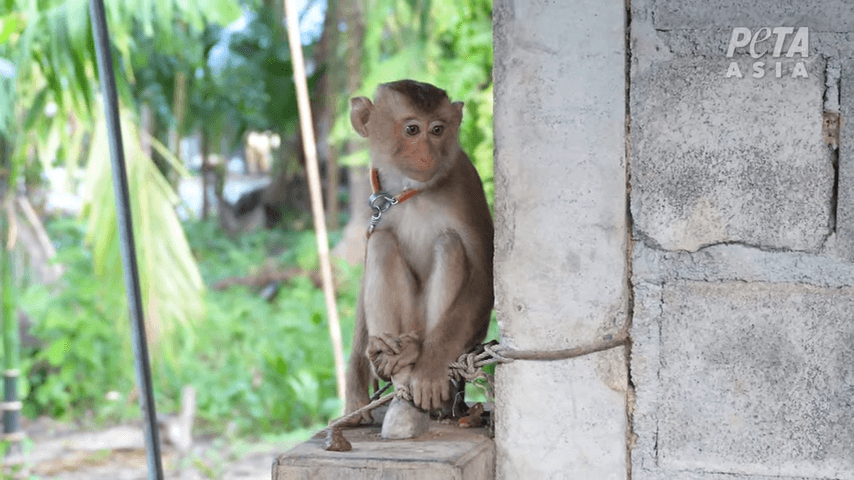Millions of people around the world are now learning about one of the darker secrets behind the coconut industry: monkeys being captured, chained, and forced into hard labor to pick coconuts. Thanks to a recent mention on HBO’s Last Week Tonight with John Oliver, the issue has reached a massive new audience and reignited campaigns calling for an end to this cruel practice.
Animal welfare organizations, especially PETA and PETA Asia, have been investigating and exposing these abuses for years. Their work has uncovered how pig-tailed macaques are stolen from their natural habitats, confined in so-called “monkey schools,” and subjected to painful training methods to make them climb trees and harvest coconuts for human consumption. These monkeys often spend their lives in chains, facing physical abuse, broken teeth, and the complete loss of freedom.
For more information on animal abuse and the fight to end wildlife exploitation, visit Sustainable Action Now’s wildlife and animal abuse section.
How Last Week Tonight Sparked Awareness
But the September 2025 “fake-out” resonated differently. It gave PETA and other activists a viral moment to amplify their campaigns, tying humor to an urgent call for action.
PETA’s Campaign Against Monkey Labor
In response to the renewed spotlight, PETA immediately shared the Last Week Tonight clip across social platforms, encouraging viewers to take action. One key push was a simple but impactful call-to-action: text COCONUT to 73822 to pressure the Thai government to ban monkey labor.
PETA’s activism on this issue, however, goes back much further. Over the last several years, the organization and its affiliates have undertaken a wide range of efforts:
- Undercover Investigations: Since at least 2019, PETA Asia has documented widespread abuse in Thailand’s coconut industry, including chains, beatings, and the cruel practice of pulling monkeys’ teeth to prevent them from biting handlers.
- Exposing “Monkey Schools”: Video evidence released in December 2024 revealed that monkeys are trained in harsh conditions and kept in isolation, sparking global outrage.
- Retailer Pressure: Following these investigations, PETA targeted major retailers to cut ties with suppliers using monkey labor. Victories include Walmart, Costco, and Whole Foods 365, all of which pledged to stop sourcing coconuts from exploitative operations.
- Challenging the Thai Government: PETA has repeatedly called out the Thai government for its so-called “monkey-free” certification program, which it claims is more of a marketing ploy than a serious solution.
- Celebrity Advocacy: Figures like The White Lotus creator Mike White have joined the cause, penning letters to the Thai government urging an end to these inhumane practices.
Each of these steps has built a foundation of awareness, but Oliver’s mention created a fresh surge of attention, pulling millions of new eyes into the conversation.
Why This Matters for Consumers
The coconut industry is global, and many products on supermarket shelves—from coconut water to coconut milk to beauty products—can be linked back to monkey labor. For everyday consumers, this means that choosing brands that do not rely on forced animal labor is a crucial step toward ending this cycle of exploitation.
By refusing to purchase from companies that source coconuts harvested by monkeys, consumers can apply real pressure on supply chains. Retailers have already shown they will listen when the public speaks out.
The Next Steps
The momentum sparked by Last Week Tonight demonstrates how a single moment in pop culture can shine a light on systemic cruelty and help build global advocacy. Animal welfare organizations, consumers, and concerned citizens all play a role in pushing for meaningful change.
For those who want to take immediate action:
- Text “COCONUT” to 73822 (U.S. only) to demand that the Thai government end monkey labor.
- Support cruelty-free coconut products and avoid brands tied to exploitative practices.
- Stay informed and spread awareness by visiting Sustainable Action Now’s coverage of animal abuse and wildlife exploitation.
As awareness grows, the message becomes harder to ignore: monkeys are not tools, they are intelligent, social beings deserving of dignity and freedom. By raising our voices together, we can help put an end to this hidden cruelty and push the global coconut industry toward ethical and sustainable practices.


